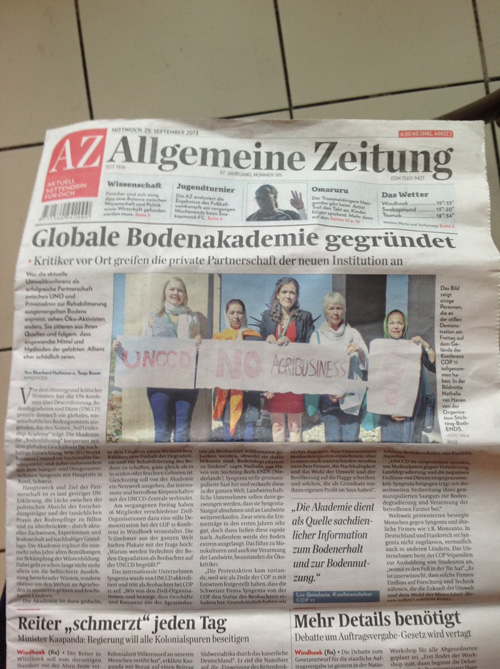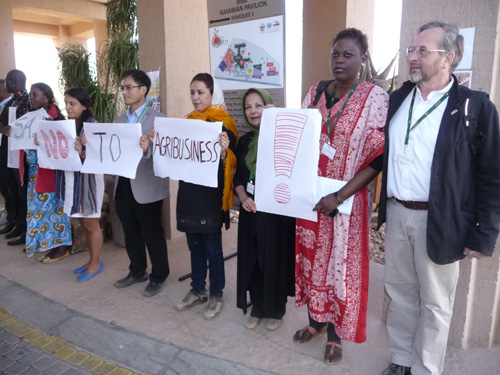Agrochemical producer Syngenta becomes observer UNCCD
Syngenta , global producer of seeds and agrochemicals, will become an ' observer ' within the UN Convention to Combat Desertification ( UNCCD ). This was decided last week during the annual meeting in Windhoek , Namibia and caused indignation among civil society groups. Groups that were present started a joint diplomatic protest. Our Both ENDS-colleague Nathalie van Haren took a leading role in this protest and was the spokeswoman towards the media. She explains what it was all about.
Food security?
"Syngenta and a handful of other agribusiness multinationals dominate the worldwide pesticides- and seed trade. According to Both Ends and partners these agribusinesses do not exactly have a positive reputation for their contribution to the prevention of land degradation. To the contrary; these companies sell their patented genetically engineered seeds under the guise of 'contributing to food security in drylands’. However, these companies will only cause a further decrease in biodiversity in these fragile ecosystems and make local farmers become dependent on their products. For decades, farmers in dry areas have been selecting seeds that can stand the drought, so they don’t need Syngenta’s seeds and chemical products. Food security in these areas is rather determined by political and socio-economic factors. "
Searching for sustainable solutions
"The UN Convention to Combat Desertification is the global convention of the United Nations on combating desertification and drought. Every country in the world has signed this convention, except for Canada who withdrew in 2012. Both ENDS is a member of Drynet, a network of local organisations and communities in dry regions searching for ways to use land in a sustainable manner. Together with my colleague Sanderijn van Beek and other members of Drynet, we were participating in the UNCCD conference in Windhoek. We wanted to put several themes on the agenda of the delegates of the UNCCD. For example, we want the discussion of combating land degradation to focus on local people. In other words, if a government is planning to stimulate sustainable land use, it is important that local communities are being involved in the discussion and decision making. They can indicate best what is necessary and what is not to make things work.”
Independent research?
“Syntenta is not only becoming an observer, but also financial partner in the UNCCD Fellowship Program, funding research on land degradation. It is a good thing that there will be adequate funds for research. The research program has been discussed for a long time by parties the UNCCD but none of the richer countries had actually reserved funds for it yet. Although the money is more than welcome, the question is whether the research will be reliable when paid by Syngenta. Will the research critically and objectively focus on the effects of agribusiness activities in dry regions? Furthermore Syngenta now has a ‘UN cover’ to plead itself free from criticism.”
Media stunt
“Both ENDS and other Drynet partners find it incomprehensible and hard to justify that Syngenta has obtained the status of observer. This is the reason why we organised a ‘media stunt’ - the first one ever done during a UNCCD conference. We wanted to make a clear statement with this action: The decision of the UNCCD does not contribute to a sustainable environment for millions of people worldwide in dry regions. With this action we urge the members of the UNCCD to first look at the impact of a company’s activities on local land users and the ecosystem in dry areas before approving such a request. In our opinion a company should obtain the status of observer when all its activities contribute to the goal of the Convention: combating desertification and drought. The activities should of course not counteract this goal, they should not be harmful to people and their environment in dry areas.”

Harassment practices by Syngenta
Read more about this subject
-
 Blog / 23 april 2025
Blog / 23 april 2025The power of trust
Trust builds trust. That is what I have learned from how Both ENDS works - within our team, with partners in joint strategies and advocacy, and in our relationships with partners as a funder. Trust is the foundation. It is what allows compassion to grow, what gives rise to hope, and what fuels real solidarity. This is especially powerful in contrast to the prevailing global trend of political and international leaders who prioritize hard measures and…
-
 article / 16 april 2025
article / 16 april 2025 -
Letter / 15 april 2025
African civil society urges Oman against EACOP support as east Africa trade expo kicks off
Just one day before the Oman East Africa Trade and Investment
Expo opens in Muscat on April 16, over 70 civil society organisations (CSOs) from Uganda, Tanzania, the Democratic Republic of Congo, and beyond have published an open letter urging the Government of Oman to refrain from providing financial or diplomatic support for the controversial East African Crude Oil Pipeline (EACOP). -
 Blog / 11 april 2025
Blog / 11 april 2025FMO is very pleased with its own success – now the local population still needs to be
The FMO development bank is proud of its results and the opportunities it seizes where commercial banks fail to act. But do the bank's actions really…
-
 News / 7 april 2025
News / 7 april 2025Food forest Ketelbroek: where food production and biodiversity come together
When Both ENDS-colleagues visit partners, they often go on a "field trip" to see how our joint work affects people and communities. This year, we did the same in the Netherlands. Food forestry pioneer Wouter van Eck demonstrates a group of Both ENDS partners how regenerative agriculture can offer…
-
Publication / 1 april 2025
-
 Blog / 31 maart 2025
Blog / 31 maart 2025International cooperation and solidarity are in the interest of both the Netherlands and Africa
Traditional development aid keeps Africa in a state of aid dependency, but development cooperation is essential to break this post-colonial dependency, argues Melvin van der Veen in response to an interview in NRC Handelsblad with the Cameroonian economist Célestin Monga. By breaking off this cooperation on the basis of equality, we are actually stifling the voices of African civil society organisations, indigenous communities, youth and…
-
 External link / 28 maart 2025
External link / 28 maart 2025 -
 Blog / 27 maart 2025
Blog / 27 maart 2025Fair trade and equal partnerships: only then can Kenya stand on its own
Several media outlets, including de Volkskrant, focused last week on the shift from “aid” to “trade,” partly in response to the state visit of the Dutch royal couple to Kenya. The idea is that it would be beneficial for Kenya to stand on its own two feet. A beautiful ideal—one I whole heartedly believe in…
-
 News / 25 maart 2025
News / 25 maart 2025Urgent call to Shell: Don’t leave the Niger Delta without cleaning up decades of pollution
Last week, Shell reported that it officially completed the sale of its on-shore oil assets in the Niger Delta, leaving behind a vast oil pollution caused by…
-
Letter / 25 maart 2025
Letter to Shell's CEO and plc Executive Committee: don’t leave the Niger Delta without cleaning up
Today, on Shell Capital Markets Day 2025, Both ENDS together with 195 international and Nigerian of civil society organisations is sending an open letter to Shell’s Executive Committee demanding a full cleanup of the SPDC pollution legacy and transparency on the cleanup process.
-
 News / 21 maart 2025
News / 21 maart 2025Dutch Royal couple visits Thogoto Forest: a green oasis on the outskirts of Nairobi
This week, King Willem-Alexander and Queen Máxima visited Thogoto Forest as part of their state visit to Kenya. They were able to see the impact of…
-
 News / 18 maart 2025
News / 18 maart 2025Abuses surrounding TotalEnergies‘ LNG project in Mozambique are piling up; Dutch support irresponsible
On Friday 14 March, the French Public Prosecutor's Office announced that it would launch an official investigation into TotalEnergies’ involvement in involuntary manslaughter during the attacks on Palma, the location of their LNG project. This umpteenth abuse makes it clear that the Netherlands…
-
 Event / 12 maart 2025, 09:30 - 11:15
Event / 12 maart 2025, 09:30 - 11:15The Conflict, Gender, Climate Nexus: Localized understanding and policy recommendations
Across the world, women lead efforts to advance peace, gender and environmental justice. From the Philippines to Mozambique, Burkina Faso to Brazil, they face a deadly convergence of violence, environmental destruction, and extractivist land grabs. As corporate interests, state forces or other armed actors expand into their territories, entire communities are displaced, criminalized, or subjected to violent repression. At the same time, worsening…
-
 News / 4 maart 2025
News / 4 maart 2025Feminist March 2025: let's take to the streets for gender justice
Women's rights are under pressure worldwide, and hard-fought rights and freedoms are being dismantled. Whereas until recently the Netherlands was a champion of emancipation, women's rights and gender justice, the current cabinet is breaking with this policy and abandoning millions of women and girls. That is why Both ENDS, together with many other allies, will be taking to the streets on 8 March. It is time to make a strong stand against the…
-
Letter / 3 maart 2025
Input for FMO’s “investment approach to responsibly managed forest plantations”
Both ENDS has been asked by FMO to comment on its draft investment approach to responsibly managed forest plantations. To follow are a number of observations and recommendations, partially informed by Both ENDS long legacy of working in the forest & land arena, in dialogue with international donors, philanthropic foundations, companies, certification bodies and notably with forest dependent communities and other land users.
-
 News / 21 februari 2025
News / 21 februari 2025Cabinet turns its back on international cooperation and solidarity with callous policy letter
Foreign Trade and Development Minister Klever's published policy letter is coldhearted and callous. It places the Netherlands in international isolation…
-
 Press release / 18 februari 2025
Press release / 18 februari 2025Trade deal fueling resource grab? 120+ groups from Europe and Indonesia sound the alarm
Brussels, 18 February 2025 - Over 120 civil society organizations and trade unions from Indonesia and Europe today call on the Indonesian government and the European Union to stop the negotiations for the Indonesia-EU free trade agreement – the Comprehensive Economic Partnership Agreement…
-
 Dossier /
Dossier /Seeking justice for the affected communities of Vale’s mining disasters in Mariana and Brumadinho
In 2015 and 2019, the Brazilian state of Minas Gerais experienced two severe mining tragedies in Mariana and Brumadinho, due to the same mining company: Vale. Since then, the affected communities have been seeking justice, via the criminal punishment of the responsible parties, and a fair compensation for the loss of their loved ones, their homes and their livelihoods. Both ENDS supports local CSOs by amplifying their quest for justice within an international audience and, more specifically, by raising awareness amongst Dutch investors in Vale about the high risks this company’s…
-
 Dossier /
Dossier /Towards a socially and environmentally just energy transition
To address the climate crisis we need to urgently transition away from fossil fuels towards clean, renewable energy. However, this transition is not only about changing energy sources. It requires an inclusive and fair process that tackles systemic inequalities and demanding consumption patterns…







